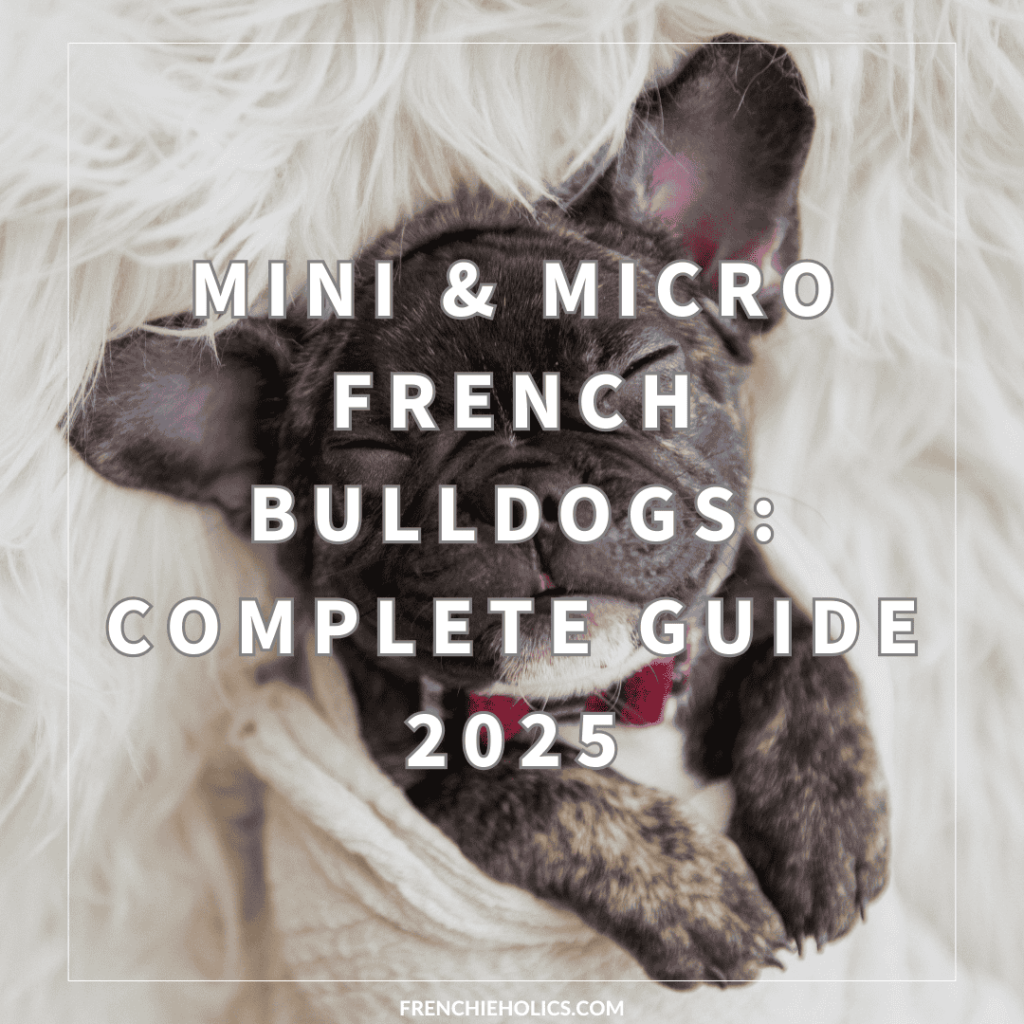Introduction to Mini French Bulldogs
The world of French Bulldogs has expanded beyond the standard-sized companions many know and love. Mini French Bulldogs—also called teacup, micro, or miniature Frenchies—have captured the hearts of dog enthusiasts seeking smaller versions of this beloved breed.
These pint-sized pups typically stand under 11 inches tall and weigh significantly less than the standard 28 pounds of their full-sized counterparts. While they retain the characteristic bat ears, smushed face, and charming personality that make Frenchies popular, their smaller size comes with important considerations.
Before falling in love with these compact canines, potential owners should understand:
- Mini Frenchies are not officially recognized by major kennel clubs like the AKC
- They’re bred through various methods, some raising ethical concerns
- Their smaller size can intensify health challenges already present in the breed
- Proper research is essential to find responsibly bred mini Frenchies
Whether you’re considering a micro bulldog or simply curious about these tiny companions, understanding what makes these dogs unique is the first step toward responsible ownership.
What Exactly Is a Mini French Bulldog?

Definition and Recognition
A mini French Bulldog is a smaller version of the standard French Bulldog, typically standing under 11 inches tall and weighing between 15-20 pounds—significantly less than the standard 28-30 pounds. Even smaller varieties, often called micro Frenchies or teacup French Bulldogs, can weigh under 15 pounds when fully grown.
It’s important to note that mini French Bulldogs are not officially recognized as a separate breed by major kennel clubs like the AKC. These organizations only acknowledge the standard French Bulldog with its established breed specifications. This lack of official recognition means there are no standardized guidelines for what constitutes a mini Frenchie, leaving the definition somewhat subjective among breeders.
Origins of the Mini Frenchie Trend
The trend toward miniaturizing French Bulldogs is relatively recent, emerging as part of a broader movement to create smaller versions of popular breeds. Standard French Bulldogs themselves were originally bred in England before being refined in France in the 1800s as companion animals.
The push for even smaller Frenchies has been driven by:
- Increasing urbanization and apartment living
- Desire for more portable companion dogs
- The appeal of perpetually puppy-like appearances
- Social media popularity of tiny, photogenic pets
Unlike some toy breeds with centuries of natural development, mini Frenchies represent a deliberate modern effort to reduce the size of an already small-to-medium breed, often using controversial breeding techniques to achieve the desired diminutive stature.
How Mini French Bulldogs Are Created

Breeding Methods
The creation of mini French Bulldogs typically involves several breeding approaches, each with its own implications for the dogs’ health and well-being. Understanding these methods is crucial for potential owners who want to make responsible choices.
The most common breeding practices include:
- Breeding runts – Selectively breeding the smallest puppies (runts) from different litters over multiple generations. While this may seem like a natural approach, consistently breeding undersized dogs can perpetuate genetic weaknesses.
- Introducing dwarfism – Some breeders deliberately introduce the genetic mutation for dwarfism to create shorter legs and smaller overall body size. This approach can lead to skeletal issues including shortened spines, bowed legs, and abnormal skull development.
- Crossbreeding – Mixing French Bulldogs with naturally smaller breeds like Chihuahuas (creating “Frenchiehuahuas”) or Toy Poodles. These dogs are then bred back to French Bulldogs over several generations to maintain the Frenchie appearance while reducing size.
- Marketing standard Frenchies’ natural size variation – Some smaller puppies within standard litters may be marketed as “mini” despite being within normal size range for the breed.
Ethical Considerations
The breeding of miniature French Bulldogs raises significant ethical questions within the dog breeding community. No reputable breeding organization or kennel club officially recognizes or endorses the breeding of teacup or micro Frenchies, which should give potential owners pause.
Ethical concerns include:
- Intentionally breeding for extreme traits can amplify health problems already common in the breed
- Many mini Frenchies suffer from intensified respiratory issues, spinal problems, and joint conditions
- The lack of breeding standards means unscrupulous breeders may prioritize size over health
- Puppies marketed as “rare” or “exotic” often command inflated prices despite—or because of—their non-standard status
Responsible dog lovers should consider that what might seem cute and desirable in appearance can translate to lifelong health struggles for these diminutive dogs.
Health Considerations
Standard French Bulldog Health Issues
Even standard-sized French Bulldogs face significant breed-specific health challenges that prospective owners should be aware of. These issues stem largely from their brachycephalic (flat-faced) structure and unique body composition.
Common health concerns in standard Frenchies include:
- Respiratory problems – Their shortened airways can lead to labored breathing, snoring, exercise intolerance, and heat sensitivity
- Spinal disorders – Including intervertebral disc disease and hemivertebrae (malformed vertebrae)
- Joint issues – Such as hip dysplasia and patellar luxation
- Eye conditions – Cherry eye, corneal ulcers, and other issues related to their prominent eyes
- Skin allergies – Especially in skin folds that require regular cleaning
These conditions already create healthcare challenges for standard French Bulldogs, requiring attentive care and often specialized veterinary treatment.
Additional Health Risks in Mini Frenchies
Mini French Bulldogs typically face all the health issues of standard Frenchies, but often with greater severity and additional complications. The breeding methods used to create smaller dogs can amplify existing genetic weaknesses.
Mini Frenchies may experience:
- More severe BOAS (Brachycephalic Obstructive Airway Syndrome) – The miniaturization process can create even more compromised airways
- Heightened skeletal issues – Particularly in dogs bred for dwarfism, including fragile bones and malformed joints
- Dental problems – Too many teeth crowded into a smaller jaw
- Organ complications – Undersized organs may struggle to function properly
- Hydrocephalus – Excess fluid around the brain, more common in miniaturized breeds
- Hypoglycemia – Small dogs can have difficulty regulating blood sugar
These additional concerns can result in reduced lifespan, diminished quality of life, and significantly higher veterinary costs.
Responsible Care
If you’ve decided a mini Frenchie is right for you despite these considerations, responsible care is crucial:
- Schedule regular veterinary checkups – At least twice yearly to monitor for breed-specific issues
- Maintain healthy weight – Extra pounds severely impact breathing and joint health
- Provide appropriate exercise – Short, gentle activities in cool weather
- Monitor temperature exposure – Extreme heat or cold can be dangerous
- Practice preventative care – Including dental cleaning and skin fold maintenance
- Consider pet insurance – To help manage potentially high healthcare costs
Be prepared to provide specialized care throughout your dog’s life, including possible surgeries to address breathing difficulties or other genetic conditions. With thoughtful attention, many mini Frenchies can live comfortable lives, though typically requiring more medical intervention than standard-sized dogs or non-brachycephalic breeds.
Appearance and Temperament
Physical Characteristics
The mini French Bulldog maintains the iconic appearance that makes standard Frenchies so recognizable, just in a more compact package. These diminutive dogs typically stand under 11 inches tall and weigh between 15-20 pounds when fully grown, with micro Frenchies weighing even less—sometimes under 15 pounds.
Their signature features include:
- Bat-like ears that stand erect and wide on a broad, square head
- A flat face with a pushed-in nose and noticeable skin folds
- Muscular build despite their small stature, with a broad chest and sturdy legs
- Short coat that comes in various colors including brindle, fawn, cream, and combinations with white
- A characteristic short tail that can be straight or screwed
Proportionally, mini Frenchies should maintain balanced features rather than appearing extremely distorted or having exaggerated characteristics. Their bodies should be compact but still follow the general structure of the standard French Bulldog.
Personality and Temperament
Much like their standard-sized counterparts, mini Frenchies typically possess charming, affectionate personalities that make them beloved companions. Their temperament generally includes:
- Playful demeanor with a love for interactive toys and games
- Strong attachment to their human family members
- Adaptability to apartment living and various household situations
- Moderate energy levels requiring short bursts of activity rather than lengthy exercise
- Alert watchfulness without excessive barking
- Sociable nature that usually extends to strangers and other pets
Mini French Bulldogs tend to be quite intelligent but may display the characteristic Frenchie stubbornness during training. They often retain puppy-like behaviors longer than standard Frenchies, adding to their appeal for many owners.
Their small size makes them especially portable companions, though their affectionate nature means they prefer being wherever their humans are rather than being left alone for long periods. These dogs thrive on interaction and make excellent lap dogs who will happily cuddle for hours while maintaining their playful spirit.
Pros and Cons of Ownership

Advantages
Owning a mini French Bulldog offers several appealing benefits that make these diminutive companions popular despite their controversial breeding:
- Size convenience – Their smaller stature makes them ideal for apartment living and homes with limited space
- Reduced food costs – Smaller dogs generally consume less food, potentially saving on monthly expenses
- Travel adaptability – Mini Frenchies fit comfortably in airline-approved carriers for under-seat travel
- Lower exercise requirements – They need less physical activity than larger breeds, suiting busy lifestyles
- Perpetual puppy appearance – Many owners find their permanently puppy-like look irresistibly charming
For many urban dwellers or those with limited mobility, the compact size of a micro Frenchie provides all the personality of a standard French Bulldog in a more manageable package.
Disadvantages
Despite their appeal, mini French Bulldogs come with significant drawbacks that potential owners should carefully consider:
- Higher healthcare costs – Intensified health issues often lead to frequent veterinary visits and treatments
- Shorter lifespan – Many mini Frenchies have reduced longevity compared to standard French Bulldogs
- Breeding ethics concerns – Supporting the mini Frenchie market may perpetuate questionable breeding practices
- Fragility issues – Their small size makes them more vulnerable to injury, especially in households with children or larger pets
- Special care requirements – From temperature sensitivity to breathing monitoring, they demand vigilant attention
The charming appearance of a mini Frenchie often comes with substantial responsibility and potentially heartbreaking health challenges that can affect both your emotional and financial investment.
Finding a Responsible Breeder
Questions to Ask Breeders
If you’ve decided a mini French Bulldog is right for you despite the health considerations, finding an ethical breeder becomes your most important task. A responsible breeder will prioritize health over size and be transparent about their breeding practices.
When speaking with potential breeders, ask the following questions:
- “What health testing do you perform on parent dogs?” (Look for OFA hip evaluations, cardiac screenings, and CERF eye examinations)
- “Can I meet both parent dogs?” (This helps verify temperament and assess their health)
- “How do you achieve the smaller size in your lines?” (Honest breeders will be transparent about their methods)
- “What health guarantees do you offer?” (Reputable breeders typically provide written health guarantees)
- “What ongoing support do you provide after purchase?” (Good breeders remain resources throughout the dog’s life)
- “How many litters does each female produce yearly?” (Ethical breeders limit breeding to protect mother dogs)
Take careful notes during these conversations and compare responses between different breeders.
Red Flags
Be vigilant for these warning signs that may indicate unethical breeding practices:
- Extremely tiny puppies being advertised as “rare” or “exotic” with premium price tags
- Breeders who won’t allow you to visit their facility or meet parent dogs
- Dogs described as teacup or micro with weights significantly below 15 pounds
- Lack of health testing documentation for breeding stock
- Puppies available immediately with no waiting list (quality breeders usually have waitlists)
- Reluctance to discuss health issues common in the breed
- Pressure tactics or significant price reductions to secure a quick sale
- Multiple litters available at once or continuous breeding of females
If a breeder uses terms like “100% healthy guaranteed” or claims their mini Frenchies have no health issues, be extremely skeptical. No responsible breeder of brachycephalic dogs would make such promises, as these breeds inherently face certain health challenges.
Alternatives to Mini Frenchies
If you’re attracted to mini French Bulldogs but concerned about the ethical and health implications, several excellent alternatives can provide similar benefits with fewer concerns:
- Standard French Bulldogs on the smaller end of the normal size range (some naturally weigh 20-22 pounds)
- Boston Terriers – Similar appearance with slightly better breathing and typically fewer health issues
- Frenchton – A French Bulldog/Boston Terrier mix that often has improved respiratory health
- Pug – Another compact companion breed with a devoted personality
- Cavalier King Charles Spaniel – Small, affectionate companion with a gentle temperament
Consider also exploring French Bulldog rescues, where smaller adults occasionally become available without supporting potentially problematic breeding practices. These organizations often provide comprehensive health information and support throughout the adoption process.
Remember that temperament, lifestyle compatibility, and health should ultimately outweigh size preferences when choosing a canine companion.
Caring for Your Mini French Bulldog

Diet and Nutrition
Proper nutrition is crucial for maintaining your mini Frenchie’s health. Their smaller size and potential health challenges require special dietary consideration:
- Choose high-quality small breed formulas with appropriate protein levels (25-30%)
- Monitor portion sizes carefully to prevent obesity, which can worsen breathing issues
- Consider moistened food or adding water to kibble to aid digestion and hydration
- Feed smaller, frequent meals rather than one or two large ones to prevent bloating
- Avoid fillers and artificial additives that may trigger allergies common in the breed
Many mini Frenchie owners find that a diet specifically formulated for brachycephalic breeds can help manage some health issues. Always consult your veterinarian before making significant dietary changes.
Exercise and Activity
Mini Frenchies need regular but carefully managed exercise to maintain health without stressing their respiratory systems:
- Aim for 20-30 minutes of low-impact activity daily, divided into shorter sessions
- Avoid exercise during hot or humid weather when breathing difficulties increase
- Choose gentle play and short walks rather than high-intensity activities
- Watch for signs of overexertion including excessive panting, blue-tinged gums, or collapse
- Provide mental stimulation through puzzle toys and training to prevent boredom
Remember that their small size doesn’t necessarily mean they need less mental stimulation—just more carefully managed physical activity.
Grooming and Maintenance
While their short coats are relatively low-maintenance, mini French Bulldogs require regular attention to specific areas:
- Clean facial wrinkles daily with a gentle, pet-safe wipe to prevent infections
- Brush their coat weekly with a soft bristle brush to remove loose hair
- Check and clean ears weekly as their bat-like ears can trap moisture and debris
- Trim nails regularly, as overgrown nails can affect their already challenged gait
- Brush teeth several times weekly to prevent dental disease, common in small breeds
Pay special attention to their skin folds and watch for signs of irritation or infection. Their compact features make them prone to various skin issues that require vigilant monitoring and care.
Conclusion and Final Thoughts
The journey to mini French Bulldog ownership should be approached with both heart and mind. While these diminutive companions offer undeniable charm and the beloved Frenchie personality in a smaller package, the ethical and health considerations cannot be overlooked.
Before bringing home a miniature Frenchie, carefully weigh:
- The potential health challenges and associated costs
- The importance of finding the most responsible breeder possible
- Whether alternatives might better suit your desire for a small companion
- Your ability to provide the specialized care these dogs often require
Remember that the smallest option isn’t always the best one. The most rewarding companion is one that’s healthy, ethically bred, and matches your lifestyle—regardless of size.
If you do proceed with a mini Frenchie, commit to being their advocate throughout their life, ensuring they receive the attentive care needed to thrive despite the challenges that may come with their breeding.

